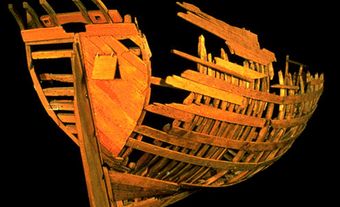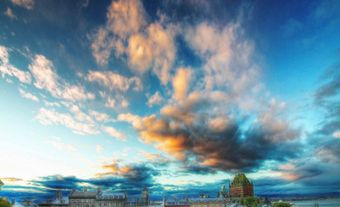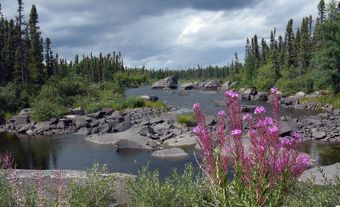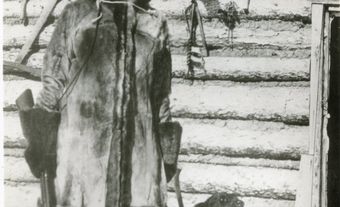Selma Barkham (née Huxley), CM, ONL, historian, geographer (born 8 March 1927 in London, England; died 3 May 2020 in Chichester, England). Selma Barkham uncovered the history of Basque cod-fishing and whaling industries in Atlantic Canada (referred to by the Basques as Terra Nova), especially in the 16th century. This research filled a gap in the history of European activity in Canada between the time of Jacques Cartier and Samuel de Champlain. Her work led to the establishment of Red Bay, Labrador as a national historic site and a UNESCO world heritage site.

Early Life
Selma Barkham was born on 8 March 1927 in London, England, to Michael Huxley and Ottilie de Lotbinière Mills. Her father was the founder and editor of The Geographical Magazine. One of her maternal great-grandfathers was Henri-Gustave Joly de Lotbinière, premier of Quebec and lieutenant-governor of British Columbia.
During the Second World War, her father was stationed at the British embassy in the United States. In 1944, Barkham returned to Europe, first to study nursing in London, England, then, after the war, to study Russian at the University of Paris and the University of London. She then worked with the Royal Institute of International Affairs and the Royal Geographical Society in London.
Career and Family Life in Canada
In 1950, Selma Barkham moved to Montreal where she worked a variety of jobs, including as the librarian at the Arctic Institute of North America at McGill University. While working at the university, she met Englishman Brian Barkham, who was completing postgraduate studies in architecture. The couple married in 1954 and moved to Ottawa, where Brian established an architectural practice. Selma was involved in the community. She was an advocate for bilingualism and promoted French among anglophone children in Ottawa.
In 1956, the Barkhams took a trip to the Basque Country, a region straddling the French-Spanish border on the coast of the Bay of Biscay, which has a distinct culture and language. Brian had previously spent time there recovering from a motorcycle accident, and had completed his degree thesis on Basque rural architecture. A friend of Brian’s told the Barkhams that Basque fisherman had been going to Terra Nova for centuries. This information became the basis of Selma’s later research.
Did you know?
In the 16th century, mariners used the name Terra Nova — which means “new land” in Spanish and Portuguese — to describe much of Atlantic Canada, from Nova Scotia to southern Labrador. For example, a map created in 1592–94, by Dutch cartographer Petrus Plancius, depicts Canada’s Eastern Seaboard and is inscribed with the Latin, Nova Francia alio nomine dicta Terra Nova. Translated this means, “New France by another name called Terra Nova.” Only later, in the 17th century, did Terra Nova come to exclusively refer to the island of Newfoundland.
Brian died in 1964 at age 35, three weeks after being diagnosed with cancer. Selma was left to raise their four children, all under the age of 10, on her own. To support her family, Selma worked as a historian for national historic sites. While working on the restoration of Nova Scotia’s Fortress of Louisbourg, she came across references to Basque fishermen in the area, furthering her interest in the topic.
Archival Research in Spain
To prepare for her work researching the Basque connection to Canada, Selma Barkham moved to Guadalajara, Mexico with her family in 1969 to learn Spanish. Three years later, they moved to Spain where she began her research in Spanish and Basque archives. While in Spain, Barkham undertook contract work with the Public Archives of Canada (now Library and Archives Canada), finding and cataloguing documents associated with Canada. When not working for the Public Archives, Barkham embarked on her own research to uncover Basque history in Canada. According to Michael Barkham, one of Selma’s sons, this was also a way for Selma to maintain her and her late husband’s bond with the region.
In Spain, Barkham took a course in paleography (the study of historic writing systems) to help her decipher the Spanish handwriting used in the 16th-century documents. Through years of researching in Spanish and Basque archives, Barkham constructed the history of Basque whaling and cod-fishing industries in Terra Nova, using insurance policies, crew agreements, provision lists, wills, shipbuilding contracts and other documents. These documents hadn’t been examined in centuries. Barkham identified a 16th century cod-fishing and whaling industry on the south coast of Labrador and Quebec, including whaling ports and the modern-day town of Red Bay. She was able to piece together the daily lives, journeys, and experiences of the whalers.
She uncovered, at the time, the oldest known original business document to have been written in Canada, a 1572 notice of debt. Michael, who had earned a PhD in geography, later discovered an even older document dating from 1563. Her work also uncovered the Basque origins of place names in Canada that were previously thought to have been French or Portuguese. For example, Barkham determined that Port au Port, Newfoundland derived from the Basque ophor portu, which means “port of rest,” while Barachois, Newfoundland came from the Basque word for a small sandbar, barachoa. Her research filled a gap in the history of European activity in Canada between the time of Jacques Cartier and Samuel de Champlain.

Finding Physical Evidence in Canada
In 1977, Selma Barkham received a grant from the Royal Canadian Geographical Society to find physical evidence to corroborate her archival research. Her expedition to southern Labrador, which included archaeologists, found evidence at four locations (including Red Bay) of Basque whaling bases from the 16th century.
In 1978, a team of underwater archaeologists used Barkham’s research to locate the San Juan, a Basque galleon that had sunk in the harbour of Red Bay in 1565, still largely preserved centuries later. In 1982, another expedition by Barkham to the Strait of Belle Isle identified more 16th and 17th-century Basque sites. Her work led to the Red Bay Basque Whaling Station being named a national historic site in 1979 and a UNESCO world heritage site in 2013.
Later Life
Selma Barkham published her findings in articles and books. Between 1997 and 2007, Barkham organized annual conferences in Newfoundland that attracted international experts. In her later life, she split her time between Canada, England and Spain. Barkham died of natural causes at age 93 on 3 May 2020, in Chichester, England.
Honours and Awards
Selma Barkham was recognized both nationally and internationally for her work. She was the first woman to receive the Royal Canadian Geographical Society’s Gold Medal. She was also a recipient of the Lagun Onari, a prestigious award granted to non-Basque individuals who made significant contributions to the Basque Country.
- Gold Medal, Royal Canadian Geographical Society (1980)
- Member, Order of Canada (1981)
- Honorary Doctor of Letters, University of Windsor (1985)
- Honorary Doctor of Letters, Memorial University of Newfoundland (1993)
- Queen Elizabeth II Golden Jubilee Medal (2002)
- Queen Elizabeth II Diamond Jubilee Medal (2012)
- Lagun Onari Award, Basque Government (2014)
- Order of Newfoundland and Labrador (2015)
- International Prize, Spanish Geographical Society (2018)

 Share on Facebook
Share on Facebook Share on X
Share on X Share by Email
Share by Email Share on Google Classroom
Share on Google Classroom



